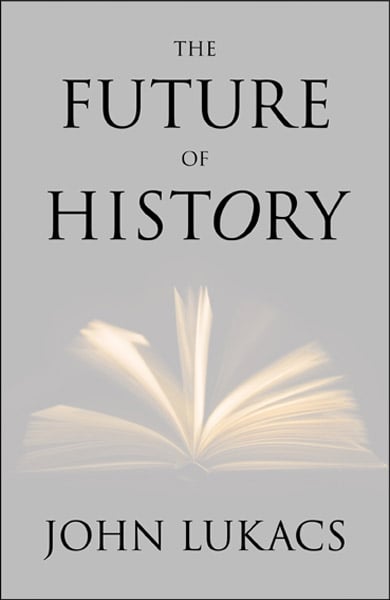As coincidence would have it, I was rereading Historical Reason, a collection of lectures by José Ortega y Gasset, for the first time in over a decade and a half when John Lukacs’s latest, The Future of History, fell onto my desk. While Lukacs’s debt to Ortega has always been clear (indeed, I first read Historical Reason because of Lukacs), I was still struck by the overlap not only in subject matter but even in the structure of these two short books.
Yale bills The Future of History as a reflection on the historical profession and the writing and teaching of history, and there is much here to justify this marketing approach (especially the chapters on “Problems for the Profession” and “Future of the Profession”). But it would be a mistake to think that this is a book written solely for professional historians or for academic students of history. Indeed, the two chapters in question seem almost, but not quite, out of place, because the main theme of The Future of History, as of so much of Lukacs’s work even before the 1968 publication of his magisterial Historical Consciousness, is the deepening of the historical sense in the minds of all men today, not just (or even not especially) the minds of professional historians.
It is here that Lukacs reminds me most of Ortega, even when The Future of History and Historical Reason diverge. Ortega demolished Cartesianism by pointing out that Descartes’s critique of philosophy was not radical enough; that (to sum up Ortega’s argument) it is not enough to say, “I think, therefore I am,” because behind the act of thinking lies the reality of our own existence: “I am, therefore I think.” (Lukacs, in Historical Consciousness, completes the circle: “I am, therefore I think, therefore I am.” The self-knowledge of thought is what allows Ortega to recognize that Descartes’s critique does not go far enough.) But the knowledge of our existence is tied up with the recognition of the existence of the world around us. To use Ortega’s example, we experience the horse itself, not the idea of the horse.
Thus, as Lukacs writes, “In sum: perspective is an—inevitable—component of reality. In sum: participation is the—inevitable—inseparability of the knower from the known.” I know the horse immediately, rather than the idea of the horse, but I know it in relationship to me. This knowledge is not objective (the horse is not absolutely independent of me), nor is it subjective (the horse’s existence does not depend on me); it is participant:
The future of history lies there. The knower and the known are not identical: but they are inseparable. That is, too, how we, on this earth, are at the center of the universe. We did not create the universe; but we invented it, and keep inventing it, time after time.
The point is so simple, so obvious, yet so quickly lost in the abstractions of modern thought. Lukacs’s task is the one that Dr. Johnson set for himself: to remind men of that which they already know. At heart, that knowledge is what constitutes truth, or rather truth is the essence of that knowledge. The task of the historian “consists of the pursuit of truth . . . often hacking his way through jungles of untruths, trees, saplings, bushes, shrubs, and many, many weeds, large and small ones.”
Yet truth is not the province of the historian alone, but of all men. Man, Lukacs has written (here and elsewhere) can tolerate injustice more than he can tolerate untruth. The growth of historical consciousness has increased our appetite for the truth, and yet we see the widespread acceptance of the manifestly untrue all around us. The larger and more well-publicized the untruth, the more easily we seem to accept it, in spite of knowing better. Might this be a portent?
In writing elsewhere of the passing of the modern age, Lukacs has explored the possibility of a post-civilizational barbarism arising out of the ashes of the modern nation-state. Would historical consciousness survive in such a world? If so, what role would it play? In the history of the future, will there be a future for history?
[The Future of History, by John Lukacs (New Haven, CT: Yale University Press) 177 pp., $26.00]

Leave a Reply